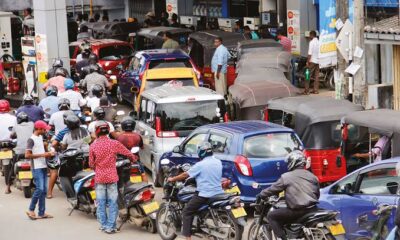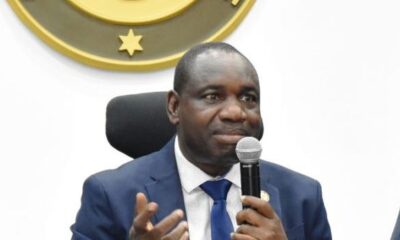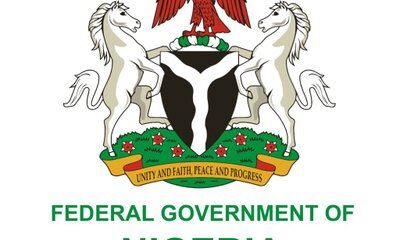Editorial
Relocation of some federal government agencies from Abuja to Lagos, blessing or a curse?
The recent pronouncement of the relocation of the Central Bank of Nigeria (CBN), Federal Aviation Authority of Nigeria (FAAN) and some other parastatals from Federal Capital Territory (FCT) to Lagos may have elicited some reactions, ideal in a society, but the question is of what essence is that decision? While some people view it as an administrative decision for convenience, others see it as political.
Whatever be the case, the agitating parties should see the Federal Government’s decision on the relocation as that of public interest. Since this relocation announcement, a lot of groups and individuals have spoken either for or against the planned relocation.
For instance, the Arewa Consultative Forum(ACF) has seen the decision to move the CBN, FAAN and few other parastatals from Abuja to Lagos as an attempt by the federal government to disrupt the current progress of the North.
Speaking through its National Publicity Secretary, Prof Tukur Muhammad Baba, the group decried such a decision, describing it as a calculated attempt by the President Ahmed Bola Tinubu-led administration to disrupt the current progress of Northern Nigeria for reasons best known to it. He was categorical that such policy is not in the best interest of the North and the country at large.
Bashir Ahmad, former Aide to President Muhammadu Buhari, however viewed the relocation of the Government agencies as normal. According to him, it does not matter where the agencies are sited, provided it will bring positive change to the country.
“It does not matter where the Federal Capital Territory is, provided it will bring positive change to the nation,” he said.
Ahmad reminded critics of the relocation policy that the Headquarters of the Nigerian Maritime Administration and Safety Agency (NIMASA), Nigerian Ports Authority (NPA) and National Inland Waterways Authority(NIWA) are not currently located in Abuja.
He said it is natural, productive and convenient that regulators stay closer to what they are regulating and this relocation plan of moving the CBN, FAAN and some other parastatals are to achieve that purpose.
In the same vein, Senior Adviser (SA) to President Tinubu on Information and Strategy, Mr Bayo Onanuga said there is nothing wrong with relocating or siting Government Agencies or parastatals in any part of the country.
He retorted that it does not in any way indicate that there are plans to relocate the Federal Capital Territory, (FCT) to Lagos, as being rumoured by some unprogressive elements in the country.
He warned those peddling the rumour, whom he accused of seeking attention for themselves to desist forthwith.
According to him, people peddling such damaging rumour could better be described as “dishonest,ethnic and regional champions,” who are only seeking attention for themselves. This, Onanuga said, is capable of pitching the North against the South and that can be disastrous if not properly handled.
“Those peddling this rumour are dishonest, ethnic and regional champions trying to draw attention to themselves. Abuja has come to stay, it is backed by law,” Onanuga said.
Whether the above assertions are true or not, the fact is that there are more important things to be done by this current federal government, instead of delving into unnecessary controversies and at times frivolities.
For instance, the inflation rate in the country is still soaring per day. Power supply that will naturally engender development is still in its sorry state, poor road networks across the country are still staring everybody in the face, insecurity is still a big challenge,among several other problems. So why leave the disease to tackle the symptoms? The Sen. Ahmed Bola Tinubu-led Government should for once be serious, it should strive to get its priorities right, instead of beating about the bush.
Of what urgency or necessity is it to relocate an existing agency or parastatal from one point to another? What of its cost implications, inconvenience of the staff and loss of manhours?
Is this relocation policy really worthwhile? These are questions begging for answers, which the current federal government must provide answers to.
It has often been said by safety practitioners that if you cannot work safely, you dare not work at all. We think this philosophy should guide the President Ahmed Bola Tinubu-led Government as it is presently constituted.
The reason is not far-fetched, because what is done well is called ‘fine’. The refineries should commence proper production that will reflect on the lives of the citizenry. By this we mean that prices of petroleum products should fall, cost of living should be tolerable to an average Nigerian.
It is only when these basic amenities are provided that Nigeria and Nigerians can give kudos to the leadership of the country. People are tired of endless promises that often end up in families going to bed hungry. So whatever should be done to address these challenges should be done and quickly too.
In as much as we are not trying to be pessimistic, what we are saying is that the nation should be put on a fast pedestal, for onward economic, socio-political development. The reason is that peers like India, Singapore, Indonesia and even Ghana and the rest have left Nigeria far behind, courtesy of poor leadership. We must therefore buckle our seat belts and be ready to accelerate, overtake, and recover.
Anything short of that is unacceptable to Nigerians. Relocation of agencies from one state to another cannot be said to be a priority now, no matter how beautiful the concept may seem. So let the first thing be done, and the nation will be better for it. When to start is definitely now!
Editorial
Nigeria must act now to mitigate flood disasters


As the rainy season looms ahead, a palpable sense of concern grips the nation.The recent cautionary message from the Federal Government to 31 state governors regarding the looming threat of floods from April to November serves as a wake-up call, demanding swift and concerted action from both state and federal authorities.
Presented by Minister of Water Resources and Sanitation Joseph Utsev, the 2024 Annual Flood Outlook paints a bleak picture, underscoring the urgent need for preemptive measures. It is not merely an emphasising advisory; it is a resounding call to arms.
The spectre of past flood calamities in Kano, Taraba, Lagos, and other states still haunts our collective memory.
The haunting images of devastated homes, displaced families, and shattered livelihoods serve as poignant reminders of the human toll exacted by our complacency.
It is imperative that we glean lessons from these tragedies and take proactive steps to forestall the impending catastrophe.
The warning issued by the Federal Government is crystal clear: floods are imminent, and the time to act is now.
The Nigeria Hydrological Services Agency’s classification of 148 local government areas across 29 states, including Lagos, Kano, and Delta, as high flood-risk zones emphasising the gravity of the situation.
Every moment of inaction heightens the risk to countless lives and properties. State governors, local authorities, and relevant agencies must set aside differences and collaborate effectively to implement robust flood preparedness and mitigation measures.
From infrastructure reinforcement to early warning systems and community awareness campaigns, a comprehensive approach is imperative to safeguard vulnerable communities.
As responsible stewards of our nation’s welfare, we cannot afford to be caught off guard. Let us heed the warning, unite in purpose, and proactively address this looming threat.
The cost of inaction is too grave to contemplate, and the time to act decisively is now. This is not a drill.
The minister’s revelation that 31 states face high flood risks, while all 36 states and the Federal Capital Territory will experience moderate flooding, demands immediate attention and collective action.
“The high flood-risk states are Adamawa, Akwa Ibom, Anambra, Bauchi, Bayelsa, Benue, Borno, Cross River, Delta, Ebonyi, Edo, Imo, Jigawa, Kaduna, Kano, Katsina, Kebbi, Kogi, Kwara, Lagos, Nasarawa, Niger, Ogun, Ondo, Osun, Oyo, Plateau, Rivers, Sokoto, Taraba, Yobe,” the Minister said.
We cannot afford to wait until the waters rise and lives are lost. The time to act is now. It’s imperative that federal and state governments, agencies, and local communities join forces to mitigate the impact of floods.
This requires a coordinated response, including public awareness campaigns, infrastructure upgrades, emergency preparedness plans, and investment in flood mitigation projects.
The future of our nation depends on it. Let us heed the warning and take proactive steps to build a more resilient Nigeria, where lives and properties are protected from the ravages of flooding. The clock is ticking; let us act now to avoid a catastrophe.
While 31 states face high flood risks, the remaining five states must also be proactive in their preparations. It’s not enough to simply warn residents to relocate from flood-prone areas; state governments must provide safe and conducive spaces for relocation, complete with essential services like relief materials, healthcare, and security.
This will help mitigate the trauma faced by displaced families. Citizens, too, have a critical role to play. They must be willing to relocate from their homes and comfort zones to prevent avoidable deaths and losses. The stark reality is that flood disasters are devastating, as seen in 2023 when 45 lives were lost, 171,545 persons displaced, and 22,666 homes partially damaged, with 5,358 others completely destroyed.
The economic toll was equally staggering, with a $4.6 billion bill that significantly dented Nigeria’s GDP. Let us learn from the past and take collective responsibility for flood preparedness. State and federal governments, agencies, and citizens must work together to build a more resilient nation, where lives and properties are protected from the ravages of flooding. The time to act is now.
In 2022, flooding claimed 662 citizens; 2.43 million others were displaced and 3,174 were injured nationwide, per NEMA.
The financial losses were estimated at $9.12 billion by the Federal Government, and by a United Nations agency at $7 billion. A UN report stated that food insecurity was aggravated in the country as 569,000 hectares of farmland were destroyed by the flood.
According to the then Minister of Water Resources, Suleiman Adamu, 178 LGAs in 32 states were declared “highly probable flood risk states.”
Although climate change remains a global concern, leading to flash floods, droughts, forest fires, and cyclones, the government must not make excuses.
They need to take lessons from previous floodings and replace their nonchalance with strategic actions and campaigns. They must do all they can to avoid the repetition of losses of lives and properties.
The citizens must play their part by clearing drainage in their vicinity, cultivating good waste disposal and environmentally friendly culture. To entrench this, the government must place strict surveillance and enforce stiff penalties against erring residents.
State governments should demolish structures erected on flood paths to enable rainwater to drain appropriately.
NGOs in the environmental niche should activate campaigns distilled in local languages through the media to prepare citizens for the flood.
The federal and state governments should be proactive in the deployment of ecological funds to provide guardrails against natural disasters. This must be used for pre-emptive measures like building bridges, desilting rivers, evacuating canals and drainage, and building dams and levees. The dams would help preserve excess rainfall to irrigate farmland during the dry season.
The government must fully embrace its onerous duty to safeguard lives and properties.
Editorial
Preparing for a challenging farming season: NiMet’s forecast and the need for proactive action


As the farming season beckons, Nigerian farmers are bracing themselves for a turbulent ride. The Nigerian Meteorological Agency’s (NiMet) forecast of a delayed and shorter rainy season has sent shockwaves across the agricultural community, threatening to upend the delicate balance of our food security.
With millions of farmers poised to plant their crops, the clock is ticking. Will our policymakers and stakeholders rise to the challenge, or will we reap a harvest of regret? According to NiMet, this year’s rainy season will commence later than usual, with the central states expecting the onset of rains around May 29 and the northern states around June 13.
Moreover, the season is predicted to end earlier than usual, between October 6 and November, in many states. This forecast raises concerns for farmers, as a shorter rainy season can lead to reduced crop yields and increased risk of drought.
To mitigate these challenges, NiMet advises planting early-maturing crop varieties at the beginning of the season. This is a wise recommendation, as it allows farmers to adapt to the predicted weather patterns and minimize potential losses.
With predictions ranging from October 6 to November, regions including Yobe, Jigawa, Sokoto, and Lagos are bracing for a shorter agricultural window. This forecast emphasised the critical importance of proactive planning and early adoption of fast-maturing crop varieties.
The essence of NiMet’s warning is clear: farmers must act swiftly to secure the necessary resources for a successful harvest. From fertilizers to seeds, the time to procure vital inputs is now, to mitigate potential setbacks and ensure a fruitful season. Traditionally, this period marks the commencement of government initiatives to facilitate the purchase and distribution of agricultural inputs. However, the silence on this front is deafening.
Instead of prioritising the long-term sustainability of agriculture, many officials seem fixated on short-term palliative measures, neglecting the imperative of future agricultural prosperity. As the countdown to the abbreviated season begins, the call to action grows louder. Farmers must seize the moment, equipping themselves for the challenges ahead, while policymakers must refocus their attention on fostering a resilient agricultural sector for generations to come.
Only through collective effort and foresight can we navigate the uncertain terrain ahead and ensure a bountiful harvest for all. As the federal government pledges to revamp the textile industry, Nigerian farmers are grappling with a more pressing concern – the exorbitant cost of fertilizers and other essential inputs. A bag of fertilizer now costs a staggering N48,000, forcing farmers to either purchase substandard products or resort to traditional alternatives, resulting in poor yields and revenue losses. The high costs of seeds, herbicides, pesticides, labour, and fuel have pushed small-holder farmers to the brink.
Despite President Bola Ahmed Tinubu’s assurances of support, including a promise to release 225,000 metric tons of fertilizers, seedlings, and other inputs in August 2023, concrete actions are yet to be seen. With food prices soaring nationwide, it is imperative that the government takes immediate steps to address the plight of farmers, who are crucial to the nation’s food security.
We urge the government to translate its promises into tangible support for farmers, including affordable access to quality inputs, to ensure a bountiful harvest and a food-secure future for Nigeria. We commend the Central Bank of Nigeria’s release of 2.15 million bags of fertilizer to the Federal Ministry of Agriculture and Food Security. However, it is alarming that there has been no update on the distribution of this vital commodity since the handover over a month ago.
Furthermore, we urge state governments to take their responsibilities in ensuring adequate input supply to farmers more seriously. We also call on the federal government to implement policies that facilitate the supply of fertilizers, seeds, and other inputs to the markets, thereby controlling rising prices.
The Presidential Fertilizer Initiative needs to be reviewed to ensure fertilizer blending plants resume production. Our farmers urgently need government support to access necessary inputs for successful cultivation. As the rains continue to falter, Nigerian farmers face an uphill battle. We urge the government to seed hope by providing essential resources – quality seeds, fertilizers, and equipment – to help them weather the storm.
Climate-resilient agriculture initiatives and weather insurance schemes will also help farmers adapt and thrive. But, there’s a greater challenge to tackle – the menace of bandits and militias terrorizing farmers, forcing them off their lands, and threatening our food security.
It’s time for decisive action! The government must act swiftly to protect our farmers, their farms, and our collective future. Let’s join forces to cultivate a brighter tomorrow, where our farmers can plant, grow, and harvest without fear. The time to act is now, for the sake of our nation’s food security and stability. Let’s sow the seeds of resilience and reap a bountiful harvest for generations to come!
Editorial
Epileptic national grid in Nigeria: The way forward


It is now commonplace to hear about the collapse of the national grid in Nigeria. In short, the news is now a periodic ritual. And for a country like Nigeria with all its potentials to be galloping with power in the name of national grid collapse is to say the least pathetic. Countries within our neighborhood we often refer to as smaller nations have since left us behind in terms of steady power supply.
Records have it that Nigeria has recorded about 140 national grid collapses since 2013 when the National Electricity Power Authority (NEPA) was unbundled and still counting. In first quarter of 2024 alone, Nigeria has recorded two national grid collapses, one on 4/2/2024 and the other on 28/3/2024. One may now ask,what is the real problem? The country generates 4,000MW of electricity for a population of approximately 200m people. This is a far cry! What do we think 4,000MW will do for such a gargantuan population? Only God will save us!
According to reports, the Federal Government is targeting about 30,000MW in 2030. But experts say Nigeria needs about 33,000MW of electricity supply with its current population to be comfortable. Until that is achieved, it remains a dream. Now that power has been put into the concurrent list, states should wake up and embark on power generation projects to fill the existing gap created by the big brother, the Federal Government. It is not enough for states and local governments to continue to cry wolf when actually they can do something about the problem.
What are the effects of frequent national grid collapse? When there is a power outage, companies and organisations must provide their outfits with alternative power supply. That is, diesel or petrol. This will automatically increase the cost of production. Private companies with little or no stamina to absorb the extra cost will close shop and the economy will be impacted negatively on. Workforce will be reduced or entirely laid off. Unemployment will creep in with its attendant factors of restiveness, social vices, and outright insurgency.
The country will start grappling with insecurity and its allies. Money that would have been spent on developmental projects will now be channelled to security, just as we have now. Lack of power equally brings about lack of social amenities, such as lack of potable water, healthcare services and poor infrastructures.In a situation like this, investors will take flight and the economy will collapse. We pray that our situation in the country does not get to this stage, because that will amount to a socio-economic crisis that no nation longs to experience.
What is the way out? The reason is that wishes and prayers are not economic strategies. The remedy of course is within our reach. The operators of the power sector often complain of gas supply challenges. The question is who is holding the gas from being supplied? Are there rough curves that should be smoothened in the contractual agreements? Who is responsible for tidying up such spots? It is a matter of putting the round peg in a round hole and the results will be natural.
There must also be commitment, patriotism on the part of the supervising agencies. Enough political will must be generated to drive these processes. This, of course, boils down to good leadership. And we strongly believe that the Renewed Hope Agenda of the President Ahmed Bola Tinubu-led Federal government is out to provide that. So there is nothing stopping us from achieving any goal we set for ourselves.
Another cause of national grid collapse is poor transmission. Others are poor infrastructures, vandalism, and liquidity crisis. These problems are not insurmountable. All hands must therefore be on deck to achieve this.
-
capital market2 years ago
Rt.briscoe, FBNH, Others halts negative performance of stock market
-
Finance3 months ago
Court orders Sen. Victor Umeh to repay N136m bank debt to AMCON
-



 Abuja Update2 months ago
Abuja Update2 months agoUNDP, FG partnership needed to achieve inclusion, equity- Minister
-
Abuja Update1 month ago
Banks drive stock market performance with N147bn gain
-



 Business1 week ago
Business1 week agoTingo Group unveils Tingo Electric, Tingo Cola drink at Lagos launch
-



 Health2 weeks ago
Health2 weeks agoCapacity training will reduce migration of health workers- NPHCDA
-



 Infotech4 weeks ago
Infotech4 weeks agoWorld Backup Day: NITDA urges Nigerians to ensure backup of data
-
News4 months ago
Oil thieves sponsoring malicious media campaign against Navy – Spokesman
















